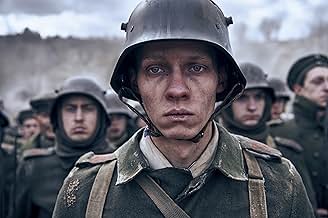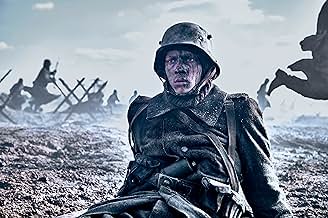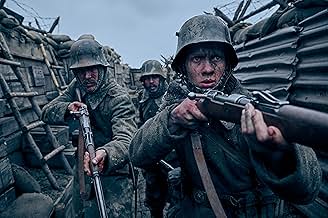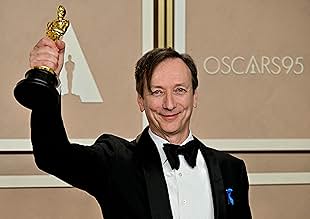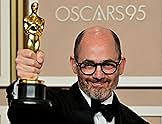As terríveis experiências e angústias de um jovem soldado alemão na frente ocidental durante a Primeira Guerra Mundial.As terríveis experiências e angústias de um jovem soldado alemão na frente ocidental durante a Primeira Guerra Mundial.As terríveis experiências e angústias de um jovem soldado alemão na frente ocidental durante a Primeira Guerra Mundial.
- Ganhou 4 Oscars
- 58 vitórias e 88 indicações no total
Enredo
Você sabia?
- CuriosidadesErich Maria Remarque's book was inspired by his own experiences as a German soldier in World War I. Remarque fought in the trenches and the novel is notable for its realistic depiction of the horrors of battle, and the trouble soldiers face during and even after the fighting.
- Erros de gravaçãoBy the end, Germany's delegation to Rethondes appears indignant as the terms and conditions of armistice are quoted by Mathias Erzberger, namely forfeiting submarines, planes, weapons and so on; what is read there was not in the November 11, 1918 capitulation act but was imposed upon Germany next year in the Treaty of Versailles.
- Citações
Matthias Erzberger: All that's left separating us from an armistice is false pride.
- ConexõesFeatured in Business Now: Episode dated 19 October 2022 (2022)
- Trilhas sonorasEbben? Ne andrò lontana ('La Wally', Act 1)
Written by Alfredo Catalani and Luigi Illica
Performed by Maria Luigia Borsi
Avaliação em destaque
Germany, May 1917. 17-year-old Paul Baumer enthusiastically enlists in the German army and heads off to war. His head is filled with patriotism, honour, visions of heroism and the confidence that Germany will win the war. He soon learns that his impressions of war are far from the reality.
Erich Maria Remarque's "All Quiet on the Western Front" was first published in 1929. It was quite revolutionary, depicting the horrific reality of war rather than the glamourous, sanitised version. In a sense it was the first anti-war novel. It was so unflinching in its portrayal of WW1 that the Nazi party regarded it as treasonous and had the book banned and stripped Remarque of his German citizenship, causing him to flee to Switzerland and ultimately the US.
In 1930 Hollywood made the book into a movie. It was superb, capturing well the horrors that Remarque depicted in his book. It deservedly won the Oscar for Best Picture (and Best Director) in 1930.
In 1979 it was adapted again, this time as a made-for-TV movie. Despite being directed by Delbert Mann and boasting a star-studded cast (Richard Thomas, Ernest Borgnine, Ian Holm, Donald Pleasance) this version was far from being in the same league as the 1930 version and didn't do the book justice. It is quite tame and the performances are quite subdued.
This, the 2022 version, once again captures the essence of the book and is quite unflinching in its portrayal of war. Graphic scenes and realistic plot show the wastefulness and horror of war.
Not as good as the 1930 version though: the characters aren't as fully developed, limiting engagement, and the plot feels a bit padded. A few drawn out scenes could easily have been shorter without losing any detail. Some style-over-substance elements too as the director went overboard with the special effects he had at his disposal (the French counter-attack with tanks and flamethrowers is a good example). The droning sound didn't help either (clearly the director has watched Christopher Nolan's "Dunkirk").
Erich Maria Remarque's "All Quiet on the Western Front" was first published in 1929. It was quite revolutionary, depicting the horrific reality of war rather than the glamourous, sanitised version. In a sense it was the first anti-war novel. It was so unflinching in its portrayal of WW1 that the Nazi party regarded it as treasonous and had the book banned and stripped Remarque of his German citizenship, causing him to flee to Switzerland and ultimately the US.
In 1930 Hollywood made the book into a movie. It was superb, capturing well the horrors that Remarque depicted in his book. It deservedly won the Oscar for Best Picture (and Best Director) in 1930.
In 1979 it was adapted again, this time as a made-for-TV movie. Despite being directed by Delbert Mann and boasting a star-studded cast (Richard Thomas, Ernest Borgnine, Ian Holm, Donald Pleasance) this version was far from being in the same league as the 1930 version and didn't do the book justice. It is quite tame and the performances are quite subdued.
This, the 2022 version, once again captures the essence of the book and is quite unflinching in its portrayal of war. Graphic scenes and realistic plot show the wastefulness and horror of war.
Not as good as the 1930 version though: the characters aren't as fully developed, limiting engagement, and the plot feels a bit padded. A few drawn out scenes could easily have been shorter without losing any detail. Some style-over-substance elements too as the director went overboard with the special effects he had at his disposal (the French counter-attack with tanks and flamethrowers is a good example). The droning sound didn't help either (clearly the director has watched Christopher Nolan's "Dunkirk").
- grantss
- 28 de out. de 2022
- Link permanente
Principais escolhas
Faça login para avaliar e ver a lista de recomendações personalizadas
Detalhes
- Data de lançamento
- Países de origem
- Central de atendimento oficial
- Idiomas
- Também conhecido como
- Sin novedad en el frente
- Locações de filme
- Empresas de produção
- Consulte mais créditos da empresa na IMDbPro
- Tempo de duração2 horas 28 minutos
- Cor
- Mixagem de som
- Proporção
- 2.39 : 1
Contribua para esta página
Sugerir uma alteração ou adicionar conteúdo ausente





